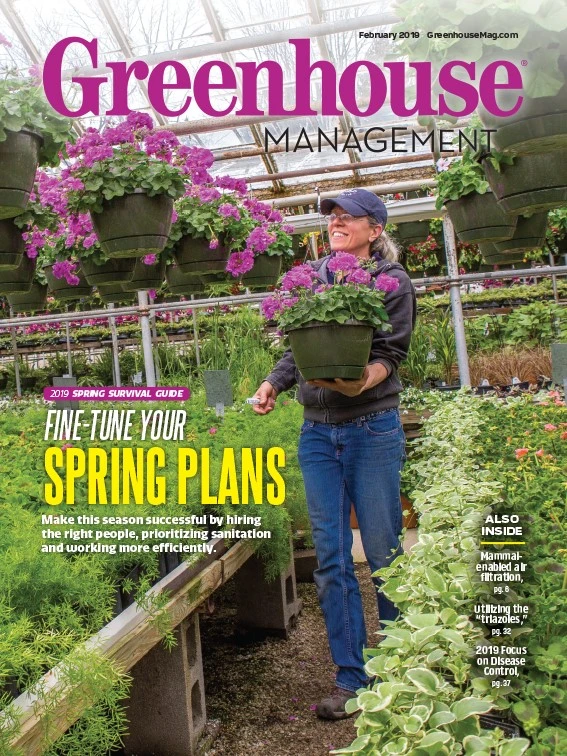

Jason Whidden was lucky to find his future wife and his future career all at once, at 14. That’s when he started dating Megan Thompson, whose parents, Lee and Judy, owned Forest Glen Greenhouses in Nova Scotia. Now, at age 33, Jason is still with the same girl, and they’re still working in her family’s business — but a lot has changed since then.
“There seems to be constant change,” Jason says of his role as grower and owner at the wholesale greenhouse. “There’s always room to grow, no pun intended. There’s always room to change and be better.”
Passing down a legacy
As a teenager, Jason started working in the greenhouse with Megan on weekends, and they continued working at Forest Glen all through junior high and high school. After they graduated from college, they returned to her family business full-time in 2008 and married soon after.
Megan’s parents, who founded the greenhouse in 1985, brought Jason under their wing by passing down all the growing knowledge they’d accumulated about greenhouse production and operations.
“It was really beneficial to be trained by my father-in-law and mother-in-law. They both have a lot to offer,” Jason says. “Judy is one of the best growers in Canada, if not North America, and her connections throughout the industry have been priceless. A lot of struggles that other growers have, I don’t have because of her talent and connections.”
Lee Thompson has retired from the family business — making Megan, Jason and Judy co-owners. Every day, Judy and Jason walk through all six acres of the greenhouse together to inspect plants and structures and set priorities for the team. Forest Glen employs 25 people in the spring, six in the fall and four for poinsettia season. For them to see one of the founders walking through the facilities every day is inspiring, Jason says.
“Just seeing Judy out there all the time, they can see the passion and the love that we all have for [growing plants],” he says. “That’s a big help for staff, when the owners actually care and are involved.”

Improving efficiency
Forest Glen has evolved since Jason joined as a teenager. When he started working there, “the facility was all free-standing hoophouses,” he says. “It was a very backyard, mom-and-dad facility. As they grew into bigger box stores, they expanded. They took some [hoophouses] down and went to gutter-connect greenhouses for the efficiency of growing and picking.”
Initially, Forest Glen sold plants to landscapers and grocery stores on a small scale, making delivery runs with a small van. Over time, they focused on big box stores, eventually growing exclusively for Loblaws supermarkets throughout Nova Scotia, New Brunswick and Prince Edward Island. This spring, Forest Glen will also start supplying several Home Depot stores in the same region.
Big box growing “makes everything more efficient,” Jason says, because having a relatively consistent, predictable program every year allows him to focus on process improvements. Adding a conveyor system, for example, helped automate some repetitious labor in the greenhouse.
“We have close to a kilometer of conveyor that runs directly from our transplant line to every house, so product is handled very little as it comes off the line,” Jason says. “We used to have six people unloading, and now it’s one person, maybe two. We’ve been able to spread out our staff over the property and free up some labor that way.”
Other aspects of Forest Glen’s operations have streamlined over time, too. For example, high-efficiency condensing blowers replaced the old hot-air furnaces, and shade curtains were added — achieving close to 50 percent heat savings. The transportation process has improved, too, because now, instead of managing its own fleet — and struggling with finding seasonal truck drivers — Forest Glen contracts its trucking to a transport company, allowing it to focus exclusively on growing quality plants.

Finding balance
According to Forest Glen's website, Megan “has been a common sight at Forest Glen since she was a baby.” Now, that tradition continues, as Jason and Megan are introducing the third generation to the family business. The Whiddens live right next door to the greenhouse, so their sons (Noah, 4, and Jacob, 1) spend a lot of time on-site.
“They’re hanging out in the office constantly. On days when it’s not busy, we’ll bring them out and they get to play in the dirt,” Jason says. “They’re a ray of sunshine for everybody.”
Jason and Megan take turns with Grandma Judy, rotating who stays home with the boys. This setup makes it easier to juggle the difficult balance between work and family by blending them smoothly together. Jason gets to do what he loves, with the people he loves — it doesn’t get any better than that.
“We’re all really lucky, and we say that a lot,” Jason says. “We’re all working, but we’re working together with our family. We’re pretty fortunate.”

Explore the February 2019 Issue
Check out more from this issue and find your next story to read.
Latest from Greenhouse Management
- Anthura acquires Bromelia assets from Corn. Bak in Netherlands
- Top 10 stories for National Poinsettia Day
- Langendoen Mechanical hosts open house to showcase new greenhouse build
- Conor Foy joins EHR's national sales team
- Pantone announces its 2026 Color of the Year
- Syngenta granted federal registration for Trefinti nematicide/fungicide in ornamental market
- A legacy of influence
- HILA 2025 video highlights: John Gaydos of Proven Winners





